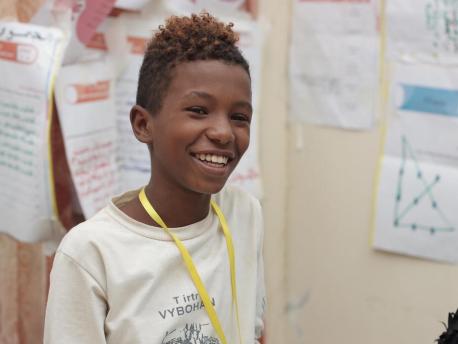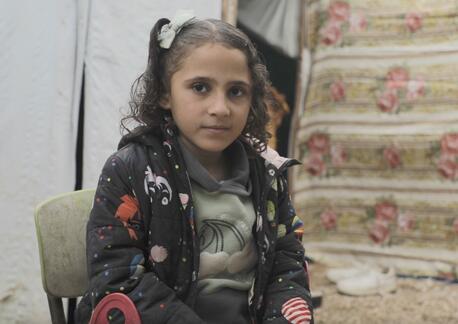
Life Skills Training Offers Hope for Vulnerable Youth in Yemen
With funding from the European Union, UNICEF is providing young people in Yemen with life skills training to equip them to take on life's challenges.
As the conflict in Yemen stretches into its eighth year, economic pressures are more acute than ever, creating financial barriers for children to continue their education. To help Yemen's children and youth develop their potential and to better equip them to face the transitions from childhood and student life to employment and active citizenship, UNICEF has developed a life skills program.
Life skills training opens doors and helps young people build a better future
With the support of the European Union, this year UNICEF is providing life skills training for 1,348 young people across seven governorates in Yemen: Sana’a, Amanat al Asimah, Dhamar, Amran, Aden, Shabwah and Abyan.
The life skills training is a lead-up to vocational training, where selected young people will learn job skills relevant for employment. It will help them build the confidence and know-how required to start their own businesses, or negotiate a place in the workforce.

In Aden, Yemen, a group of young people are learning life skills to ease the transition from school to employment as part of a program organized by UNICEF and implementing partner SOS Foundation for Development, with funding from the European Union. © UNICEF/UN0636686/ALfilastini
Mohammed and Bassam, both 14, had to drop out of school in the fifth grade when their families could no longer afford to send them.
I have learned problem solving, and I can speak publicly with more confidence. — Mohammed, 14
In the life skills program, “I have learned problem solving, and I can speak publicly with more confidence,” Mohammed says. “I’ve also learned communication and negotiation skills. I want to learn solar panel maintenance, and I think these skills will help me succeed."
Bassam’s mother suggested that he join the life skills training. “So far I’ve developed decision-making skills," he says. "I want to learn electrical maintenance, so that I can help support my family and provide a future for myself.”

Mohammed, 14, reports the life skills training program has given him confidence and improved his public speaking skills. "I've also learned communication and negotiation skills," he says proudly. "I recently used them at home to mediate a family dispute." © UNICEF/UN0636684/ALfilastin
Samira, a trainer from UNICEF’s implementing partner, SOS Foundation for Development, has been a leader in her community for decades. She also heads an association for women’s rights. “The children have been very responsive to the training; they arrive early at 7 a.m. and stay late," she says. "They want to learn, and ask lots of questions.”
Offering an alternative to early marriage and recruitment into armed groups
At first, attendees may not be comfortable speaking, or may have doubts about the whole project, but they soon open up and start to share their ambitions.
Samira has seen the impact of life skills training on young people in her community. “These trainings are helping to prevent early marriage, and giving confidence to young girls to speak with their parents and delay getting married until they are ready to manage a household,” she says.

When 17-year-old Fatima's father suggested she get married, she told him she wasn't ready. She says participating in the life skills program has helped her develop her sense of self-worth. She'd like to learn sewing and business skills so she can open a tailoring business to help support her family. © UNICEF/UN0636685/ALfilastini
The training also helps to prevent recruitment of boys into armed groups. “We used to see teenage boys getting married, and then their fathers would tell them to go out and get a job. Without education or skills, recruitment was the only opportunity, and this left many girls widowed with young children,” Samira explains.

The life skills training and conversations with their peers and instructors give young people in the program a sense of possibility and purpose. © UNICEF/UN0636688/ALfilastini
Hala, a high school teacher and a trainer with SOS, says the young people teach her skills as well. “The young people are benefitting from the life skills and applying them to their personal lives," she reports. "They are thinking outside the box, becoming creative and starting initiatives within their communities. They are applying their skills to negotiate issues at home, and are talking excitedly about their futures. We have learned from them that poverty need not be a barrier, and to have hope and ambition despite difficult circumstances."
UNICEF is appealing to donors for support to meet the urgent needs of Yemen's children, who are growing up in one of the world's worst humanitarian crises. Your contribution can make a difference. Please donate.
Top photo: Fourteen-year-old Bassam left school in the fifth grade, after his parents could no longer afford to pay his school fees in Aden, Yemen. He's practicing decision making and problem solving as part of a life skills training program organized by UNICEF and implementing partner SOS Foundation for Development, with funding from the European Union. © UNICEF/UN0636687/ALfilastini
HOW TO HELP
There are many ways to make a difference
War, famine, poverty, natural disasters — threats to the world's children keep coming. But UNICEF won't stop working to keep children healthy and safe.
UNICEF works in over 190 countries and territories — more places than any other children's organization. UNICEF has the world's largest humanitarian warehouse and, when disaster strikes, can get supplies almost anywhere within 72 hours. Constantly innovating, always advocating for a better world for children, UNICEF works to ensure that every child can grow up healthy, educated, protected and respected.
Would you like to help give all children the opportunity to reach their full potential? There are many ways to get involved.





